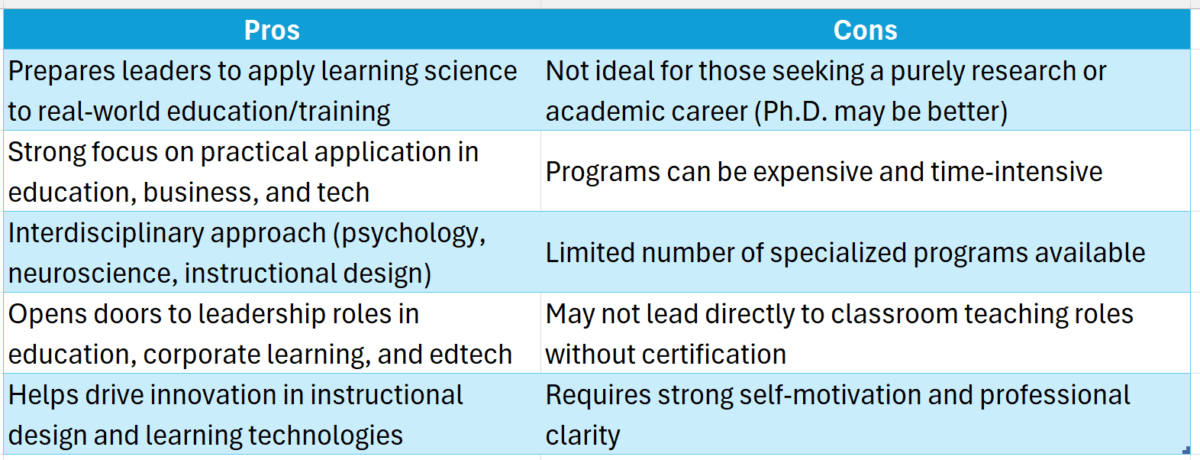Understanding what a Doctor of Education in Applied Learning Sciences is can open doors to exciting opportunities. This advanced degree focuses on how people learn and how to improve educational practices. It’s not just about teaching; it’s about understanding the science behind learning, which is crucial in today’s ever-evolving educational landscape.
What Does This Degree Involve?
A doctorate in applied learning sciences dives deep into various aspects of education. Here are some key areas it covers:
- Learning Theories: Understanding how different theories impact learning.
- Curriculum Development: Designing effective educational programs.
- Research Methods: Conducting studies to improve educational practices.
This degree is perfect for educators who want to make a real difference in how students learn.
Why Pursue This Degree?
Earning a Doctor of Education in Applied Learning Sciences offers several benefits:
- Career Advancement: Opens doors to leadership roles in education.
- Expertise: Become an expert in learning processes and educational strategies.
- Impact: Influence educational policies and practices on a larger scale.
Whether you’re considering a post doctoral in education or looking to specialize further, this degree equips you with the knowledge to lead and innovate in the field of education.
Contact Now to Pursue Your Dream Degree From Your Nearest College
What Makes a Doctorate in Applied Learning Sciences Unique?

When considering advanced education, many wonder about the unique aspects of a Doctorate in Applied Learning Sciences. This degree is not just another title; it represents a deep dive into understanding how people learn and how to apply that knowledge effectively. For educators and professionals, this specialization can open doors to innovative teaching methods and impactful educational practices.
Focus on Real-World Application
Unlike traditional programs, a doctor of education in applied learning sciences emphasizes practical application. Students learn to translate theories into real-world strategies that enhance learning experiences. This focus prepares graduates to tackle educational challenges head-on, making a tangible difference in classrooms and organizations.
Interdisciplinary Approach
This doctorate blends insights from psychology, technology, and education. By studying various fields, students gain a comprehensive understanding of how learning occurs. This interdisciplinary approach is what sets the doctorate in education curriculum and instruction apart, as it equips graduates with diverse tools to foster effective learning environments.
Career Opportunities
Graduates of this program often pursue roles such as educational consultants, curriculum developers, or even academic researchers. With a post doctoral in education, they can further specialize in their interests, leading to even more opportunities in the ever-evolving field of education.
Key Benefits of Pursuing a Doctorate in Applied Learning Sciences
Pursuing a Doctorate in Applied Learning Sciences can be a transformative journey. It’s not just about earning a degree; it’s about diving deep into how people learn and applying that knowledge in real-world settings. This field is crucial for educators, trainers, and anyone interested in enhancing learning experiences.
Enhanced Career Opportunities
A doctor of education in applied learning sciences opens doors to various roles. Graduates can work in educational institutions, corporate training, or even policy-making. This degree equips you with skills that are highly sought after in today’s job market.
Practical Knowledge Application
With a focus on real-world applications, this program emphasizes practical knowledge. You’ll learn to design effective educational programs and improve learning outcomes. This is especially beneficial if you’re considering a post doctoral in education or want to influence curriculum development.
Networking and Collaboration
During your studies, you’ll connect with like-minded professionals. This network can lead to collaborations and opportunities in the field. Engaging with peers and mentors is invaluable, especially when exploring advanced topics in doctorate in education curriculum and instruction.
How Does a Doctorate in Applied Learning Sciences Impact Your Career?
A Doctorate in Applied Learning Sciences is not just a degree; it’s a transformative opportunity in education. This advanced degree equips you with essential skills to understand how people learn and apply that knowledge effectively in real-world settings. So, how does a doctorate in applied learning sciences impact your career? Let’s explore!
Career Advancement Opportunities
With a Doctor of Education in Applied Learning Sciences, you unlock various career paths. You could become an educational consultant, curriculum developer, or university professor, each role allowing you to influence education delivery and experience.
Key Benefits of This Degree
- Expertise in Learning: Develop a deep understanding of learning theories and practices.
- Leadership Roles: Prepare for leadership positions in educational institutions.
- Research Opportunities: Engage in post-doctoral research, contributing to the field’s knowledge base.
Additionally, this degree fosters a strong professional network, connecting you with educators, researchers, and industry leaders for collaboration. It also enhances your teaching skills, enabling you to create engaging learning environments that meet diverse student needs. Finally, with advanced knowledge, you can influence educational policies, shaping curriculum standards and teaching practices at various levels.
Contact Now to Pursue Your Dream Degree From Your Nearest College
What Are the Core Components of a Doctor of Education in Applied Learning Sciences Program?
Understanding what a Doctorate in Applied Learning Sciences entails is crucial for anyone considering advanced education. This degree focuses on how people learn and how to improve educational practices. It’s not just about teaching; it’s about transforming learning experiences for everyone involved.
A Doctor of Education in Applied Learning Sciences program typically includes several core components that shape future educators and leaders. Here are some key areas of focus:
Curriculum Development
- Educational Theory: Students explore various learning theories that inform teaching practices.
- Instructional Design: This involves creating effective educational programs tailored to diverse learners.
Research and Analysis
- Data-Driven Decision Making: Candidates learn to analyze educational data to improve learning outcomes.
- Action Research: This hands-on approach allows students to implement changes in real-world settings and assess their impact.
Leadership and Policy
- Educational Leadership: Students develop skills to lead educational institutions and influence policy.
- Advocacy: Understanding how to advocate for effective educational practices is crucial for graduates.
By mastering these components, graduates are well-prepared for roles in education, whether they pursue a post doctoral in education or focus on curriculum and instruction. This degree opens doors to making a significant impact in the field of education.
Exploring the Future of Education with a Doctorate in Applied Learning Sciences
Have you ever wondered how education can evolve to meet the needs of today’s learners? A Doctorate in Applied Learning Sciences is a key to unlocking innovative teaching methods and improving educational outcomes. This degree focuses on understanding how people learn and how to apply that knowledge in real-world settings.
What Does This Degree Involve?
A Doctor of Education in Applied Learning Sciences dives deep into the science of learning. Students explore various topics, including:
- Learning theories
- Curriculum development
- Educational technology
This program equips educators with the skills to design effective learning experiences that cater to diverse student needs.
Why Pursue This Degree?
Opting for a post doctoral in education can open many doors. Here are some benefits:
- Career Advancement: This degree can lead to leadership roles in education.
- Research Opportunities: Engage in groundbreaking research that shapes future educational practices.
- Impactful Change: Contribute to developing curricula that enhance student engagement and success.
In summary, a doctorate in education curriculum and instruction prepares you to be a leader in the educational field, making a lasting impact on how we teach and learn. Embracing this journey means being at the forefront of educational innovation.
How CollegeDegree.Education Can Support Your Journey to a Doctorate in Applied Learning Sciences
A Doctorate in Applied Learning Sciences is more than just a degree; it’s a pathway to transforming education. This advanced program focuses on understanding how people learn and how to apply that knowledge in real-world settings. With a doctor of education in applied learning sciences, you can lead innovative educational practices that make a difference.
How CollegeDegree.Education Can Support Your Journey
At CollegeDegree.Education, we understand that pursuing a doctorate can feel overwhelming. That’s why we offer tailored resources and guidance to help you navigate your educational journey. Here’s how we can assist you:
- Expert Faculty: Our experienced educators provide mentorship and support throughout your studies.
- Flexible Learning Options: We offer online and hybrid courses to fit your busy schedule.
- Networking Opportunities: Connect with fellow students and professionals in the field to share insights and experiences.
Completing a post doctoral in education can open doors to exciting career opportunities. Whether you aim to teach at the university level or lead educational initiatives, our program equips you with the skills needed to excel. Plus, our doctorate in education curriculum and instruction ensures you gain a deep understanding of effective teaching strategies.
Contact Now to Pursue Your Dream Degree From Your Nearest College
FAQs
1. What is a Doctor of Education in Applied Learning Sciences?
It’s a professional doctorate focused on understanding and improving how people learn in various settings—like schools, workplaces, and digital environments—using research-based methods.
2. Who should pursue this degree?
Ideal for educators, instructional designers, learning consultants, or organizational leaders who want to design and evaluate effective learning environments.
3. How is it different from a Ph.D. in Education?
An Ed.D. is practice-oriented and focuses on real-world applications of learning science, while a Ph.D. is more research-intensive and academic-focused.
4. What topics are typically covered in the program?
Courses may include cognitive science, learning analytics, instructional design, human development, and educational technology.
5. Is the program available online?
Many universities offer fully online or hybrid formats to accommodate working professionals.
6. How long does it take to complete?
Most Ed.D. programs in Applied Learning Sciences take about 3 to 4 years to complete, depending on part-time or full-time enrollment.


